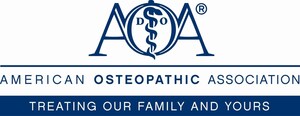CHICAGO, March 23, 2020 /PRNewswire/ -- More than 6,200 osteopathic medical students and past DO graduates matched into residency programs through the 2020 National Resident Matching Program (NRMP) Match, the first combined match since the transition to a single graduate medical education accreditation system began. A total of 90.7% of DO students matched into residency programs in 38 specialties.
This year, both the number of osteopathic applicants who matched into residency via the NRMP Match and the percentage of osteopathic medical students who successfully matched in NRMP's match were record highs.
"As the 123rd president of the AOA, one of my goals has been to help define and preserve the distinctiveness of osteopathic medicine," said AOA President Ronald Burns, DO, FACOFP. "The program directors have spoken, and they clearly see the value and distinctiveness that exists within osteopathic candidates."
The specialty breakdown in DOs' match results aligns with the osteopathic profession's historic emphasis on careers in primary care, with 56% choosing family medicine, internal medicine, pediatrics and combined primary care residencies.
"As a family physician, I embrace the osteopathic philosophy in my own practice and am excited to see so many of our graduates selecting primary care specialties," said Dr. Burns. "However, I am equally excited to see the breadth of specialties represented by our profession, as our distinct approach to care spans all specialties."
For graduating fourth-year osteopathic medical students, the top 15 specialties by number of matches are:
- Family medicine
- Internal medicine
- Emergency medicine
- Pediatrics
- Psychiatry
- Anesthesiology
- Transitional (PGY1 only)
- OB-GYN
- Surgery
- Internal medicine-preliminary (PGY1 only)
- Orthopedic surgery
- Neurology
- Pathology
- Physical medicine and rehabilitation
- Internal medicine-primary
In all, 2,730 positions were filled in non-primary care specialties. View the NRMP data.
The AOA, the Accreditation Council for Graduate Medical Education (ACGME) and the American Association of Colleges of Osteopathic Medicine are currently completing a five-year transition to a single graduate medical education accreditation system, which will conclude on June 30, 2020.
Starting this year, the vast majority of osteopathic medical school graduates are entering residency via the NRMP Match. To date, nearly 90% of all AOA training positions have transitioned to ACGME accreditation, with additional positions expected to transition in the next three months.
"A consistent commitment to our osteopathic philosophy, principles and practice throughout the professional lifecycle of the osteopathic physician speaks directly to the quality of our candidates," said AOA CEO Kevin Klauer, DO, EJD, FACEP. "Regardless of their chosen specialty, an osteopathic physician is uniquely educated, tested for licensure and certified in their chosen specialty."
While 6,215 students and DO graduates matched into residency through the NRMP Match, additional DO candidates found their residencies last week via the NRMP's Supplemental Offer and Acceptance Program (SOAP). SOAP numbers will be available in early May.
Also this match season, 331 graduating osteopathic fourth-years and recent graduates were placed via the military match, which places applicants into programs run or sponsored by the military. A small number of graduating osteopathic fourth-years and recent graduates were placed into programs via smaller specialty matches such as the San Francisco Match.
"Congratulations to our 6,215 newly matched DO PGY1s! You've earned this wonderful honor, and the AOA is very proud of each and every one of you," said Dr. Klauer. "And congratulations to our colleges of osteopathic medicine, the Commission on Osteopathic College Accreditation and the American Association of Colleges of Osteopathic Medicine for providing a learning environment promoting true excellence."
The American Osteopathic Association
The American Osteopathic Association (AOA) represents more than 151,370 osteopathic physicians (DOs) and osteopathic medical students; promotes public health; encourages scientific research; serves as the primary certifying body for DOs; and is the accrediting agency for osteopathic medical schools. To learn more about DOs and the osteopathic philosophy of medicine, visit www.DoctorsThatDO.org.
SOURCE American Osteopathic Association

Related Links
WANT YOUR COMPANY'S NEWS FEATURED ON PRNEWSWIRE.COM?
Newsrooms &
Influencers
Digital Media
Outlets
Journalists
Opted In





Share this article